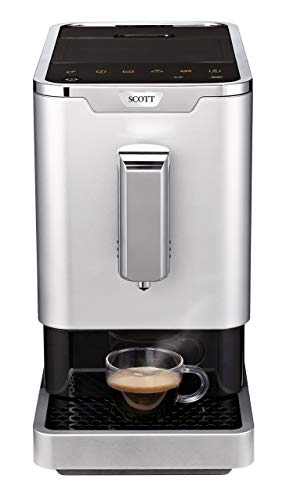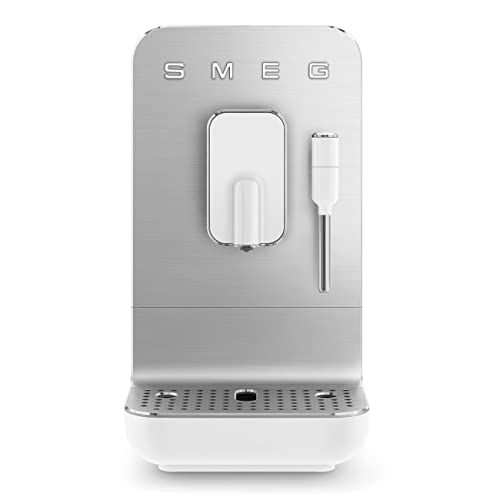5 Myths About Coffee Machine Coffee Beans That You Should Avoid
페이지 정보
 Choosing the Right Coffee Beans For Your Coffee Machine
Choosing the Right Coffee Beans For Your Coffee MachineUsing the Best bean to cup coffee machine usa coffee beans can make a an enormous impact on the quality of your coffee. This is particularly true for bean-to-cup machines.
They have a hopper is filled with beans. They then automatically grind them to the right size for extraction. They also have a brew chamber that holds hot water.
Consistency
Bean-to-cup machines are excellent for making coffee. They can be used with the right coffee beans to make an excellent cup of coffee each time. To ensure that your coffee tastes great it is essential to select the best beans and roast them properly. It is also important to determine the best grind size for your brew method. The grind size is vital because it determines the speed at which water will move and the amount of flavor is extracted. It is essential to choose the grinder that can produce consistent grinding, which is appropriate for the method you use to brew.
For all brewing methods it is recommended that you use medium-coarse beans as this grind size guarantees an even extraction and a balanced taste profile. It is crucial to avoid using dark roast beans in a bean-to-cup machine, as they tend to be oily and could cause a blockage in the burrs of your grinder. This could lead to a buildup of coffee oils, which can result in a bitter cup of coffee.
The quality of coffee beans can be compromised due to a variety that include storage and grinding. If beans are stored too long, they lose their moisture content as well as the aromas that make them aromatic. It is important to purchase freshly coffee beans to use in your commercial machine. It is also a good idea to choose a medium-to-dark roast, as these are better suited for bean-to-cup machines.
The right beans for your machine will also be determined by your personal taste and preferences. Some people choose to use solely Arabica beans while others prefer mixing. There are also many different roast levels to choose from, ranging from light to dark. Certain roasts are more suitable for certain brewing methods and others can be used in any type of coffee maker.
The consistency of the grind may also influence the flavor of coffee. A coarser grind will allow water to move through it more quickly however, it can also be more likely to extract too much flavor (a condition known as over-extraction). The shape and size of the coffee particles are also important. If they are of different sizes and shapes, it can influence the way water flows through the grounds. This could lead to certain areas to be excessively extracted.
Cost-effectiveness
The purchase of a coffee maker could seem like a significant expense but in the long run it will be cheaper than buying expensive pods. You'll also have a wider selection of beans and not be restricted to the selection that are provided by a rental company. In addition, you'll save on maintenance costs and not have to worry about refills or ongoing service contracts.
There are many different types of coffee machines on the market, and deciding the right one for your workplace will depend on your personal preferences and preferences. A bean-to-cup machine for instance, can give you the freshest, most authentic taste. However, a pod machine offers convenience and a wide range of flavors at an affordable price.
Bean-to cup machines are more expensive than pod machines, but have many advantages like less waste and a better cup of coffee. They can also be used with a variety of beans, making them a good option for offices who want to cater to the tastes of a diverse group of employees.
The kind of beans you use in your coffee machine will determine the taste and quality of your cup of joe. Choose medium roast beans. They are roasted to just the right amount to develop complex flavors, but not enough to lose their original characteristics. Also, it is crucial to ensure that the beans are freshly roast, because stale or old beans can affect the final product.
The use of ground beans is cheaper than buying coffee that has been pre-ground, but you'll have to buy grinders and invest in the right equipment. It's worth it in end because you'll be able alter the grind's size and strength to your preferences and will have more control over the brewing process. You'll also avoid the additives and toxins that are commonly found in commercially produced ground coffees. You'll also decrease the amount of waste you generate, as pods are expensive and difficult for recycling because of their aluminum and plastic components.
Variety
There are a variety of coffee beans available that each have a distinctive flavor profile that can be used to complement a variety of drink and food recipes. Certain beans are roasted darker than others, which can affect the flavor and aroma of your coffee. Certain coffees are roasted lighter and can have a more fruity or floral flavor.
Choosing the right type of bean for your coffee machine can be a challenge. There are a lot of variables to consider including the origin and processing method, and the roast color. It is also crucial to select beans that were recently roasted. Beans that have been roasted for too long may lose their flavor and aroma.
While there is no single kind of coffee that is better for bean-to-cup machines, some are more suitable than others. Dark roasts, for example are ideal for espresso drinks, while lighter roasts are better suited for filter coffee. A good rule of thumb is to play with a variety of flavors and varieties until you discover the ones that suit your preferences.
Bean-to-cup machines are fast efficient, easy to use and versatile. They can be used to make coffee, cappuccino and latte, as with other milky caffeinated drinks. They are especially popular with people who prefer a hands-free experience. With a bean-to-cup machine, you don't need to fret about pressing a portafilter, tapping out the cake tray, or filling a water tank. They are available from most major retailers. They are perfect for use at home.
Water and coffee bean to cup machine beans are the only two components that are required to make coffee. To enjoy a great cup of coffee, it is important to use water that has been filtered and high-quality beans. The kind of coffee beans you select will affect the taste and aroma of your cup of coffee.
Apart from ensuring that the beans are of high-quality You should also be aware of the roast's color and smell. Light roasts have a subtler flavor, while medium roasts have a full-bodied and balanced taste. Dark-roasted beans are best for espresso, while medium and light roasts are better suited for filter coffee makers and bean-to-cup machines.
If you're looking to prepare an espresso or pour a cup of filter coffee, you can achieve your desired outcome using the coffee bean grinder made by De'Longhi. The bean-to-cup machine can grind whole coffee beans into fine ground and make a cup in under a minute. It can also produce an espresso cup, latte or chai tea.
Environment-friendly
Sustainable coffee is crucial since it's one of the most loved drinks in the world. When it comes to coffee, sustainability covers social, environmental, and economic aspects. When buying coffee beans look for Fair Trade or UTZ certifications to ensure that farmers are receiving an appropriate price for their crops and are not using harmful chemicals. These certifications also help to ensure the protection of the environment.
Despite its numerous benefits, coffee is a resource-intensive plant. The process of growing, processing, and packaging of coffee beans creates greenhouse gases, deforestation and water pollution. However the use of sustainable coffee beans and brewing techniques can help to reduce these negative impacts. A recent life-cycle assessment (LCA) study looked at the impact of various brewing systems on the environment. Researchers discovered that the Moka pot, as well as single-serve capsules made of aluminum left the most environmental footprints. The former caused the most damage to nonrenewable resources, and the latter produced large amounts of waste.
According to the scientists who conducted the LCA production and cultivation are the two main elements that contribute to the environmental footprint of a cup coffee. Coffee cultivation is a major energy use and uses lots of pesticides, fertilizers, and machinery that emit greenhouse gases. It is also a major factor in deforestation in the Amazon basin.
In fact, a 2021 study found that coffee produced by the least sustainable methods produced the same amount of carbon dioxide as the equivalent amount of cheese, and was about half of the emissions of beef. This was due to the use of intensive fertilization, irrigation and the use the use of nitrous oxide-releasing pesticides. But the positive side is that if we change to more sustainable practices, the negative impact could be significantly reduced.
There are a variety of ways to make your coffee eco-friendly, including using reusable cups and mugs, using a powerful coffee machine, and buying Fair Trade or UTZ certified beans. If you're planning on using coffee pods, make sure you choose ones that are 100% compostable. You can also purchase loose coffee grounds and use them to enhance your garden soil.

- 이전글A Trip Back In Time The Conversations People Had About Door Doctor 20 Years Ago 24.07.27
- 다음글Can Motorcycle Accident Lawsuit One Day Rule The World? 24.07.27
댓글목록
등록된 댓글이 없습니다.









